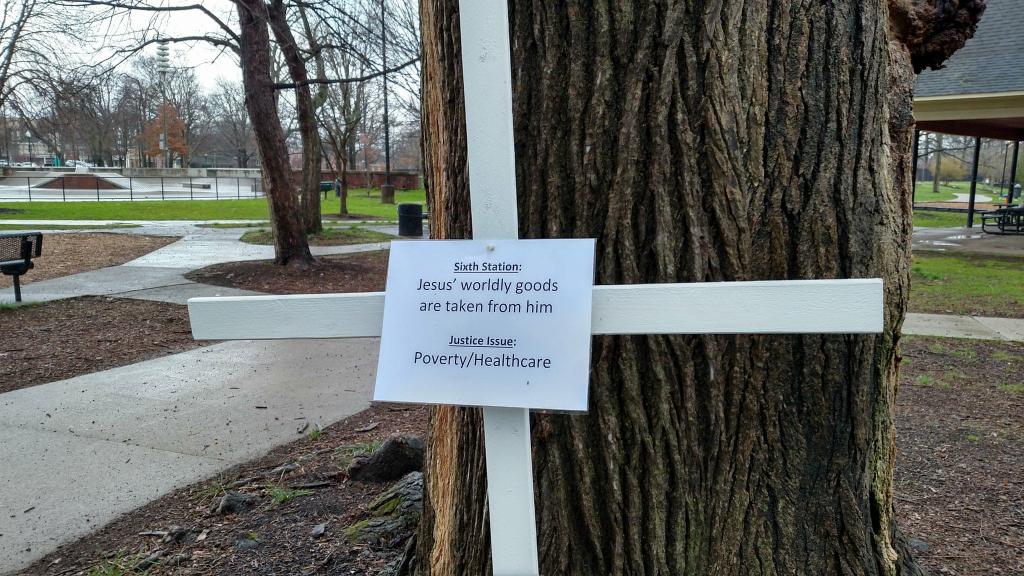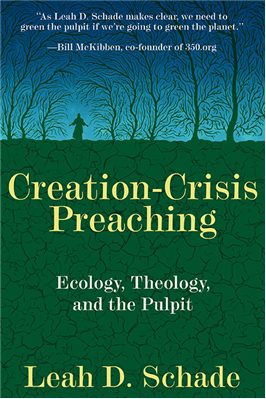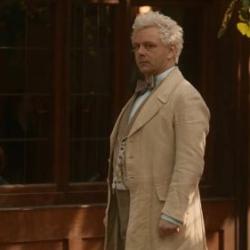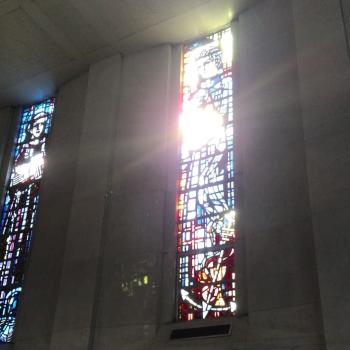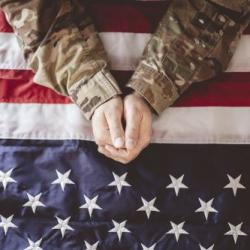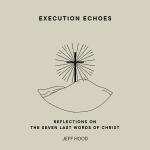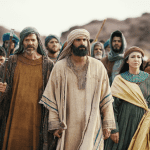Cold gray rain dripped down our hoods and umbrellas as the gathering of Christians moved from white cross to white cross, singing simple hymns and chants as we went. Over 40 of us had come from different churches and denominations to take part in an Ecumenical Stations of the Cross at Woodland Park near downtown Lexington, Kentucky.*
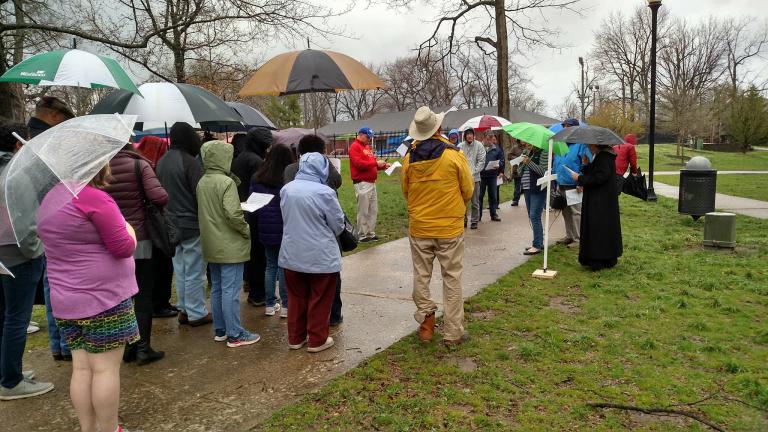
What set this Stations of the Cross apart was its focus on justice issues that affect us globally and locally. Clergy from different churches chose issues to match with the scripture passage for each station. Their reflections were brief but poignant and thought-provoking.
At each station I found myself recalling how that justice issue intersected with specific aspects or instances in my life and ministry.
The first station, “Jesus is condemned” focused on the issue of incarceration.
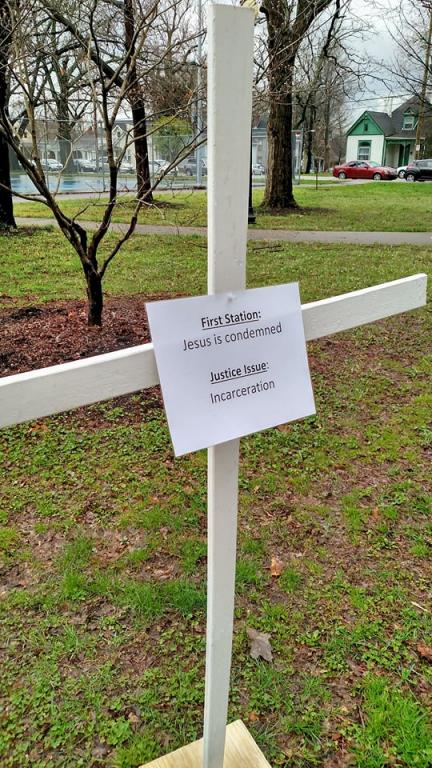
I thought of the letters I had written to a woman in prison who had killed someone because she had driven drunk. I recalled of the visit I made to the young man who had violated his parole due to his addiction. And I remembered the dialogues I had had with members of my congregation in Pennsylvania who worked in the prison system. I shuddered remembering the stories they told me about what it’s like to work in a place where metal clangs and light is harsh, and you could never trust anyone. I remembered my clergy colleagues in the ELCA who have worked diligently to reform the criminal justice system that profits from a racialized penal system.
Jesus died for the prisoners and the prison guards. He died for the victims of crime . . . many of whom become criminals themselves. Jesus died as a criminal.
At the second station, the pastor framed Jesus carrying his cross through the lens of addiction.
I recalled standing in the living room of the girl whose parents had called me because they had discovered drugs in her bedroom. This girl who I had confirmed just a few years earlier, now stood before me as someone I barely recognized. I thought of one parishioner whose grown son had stolen from him to support an addiction to pain medication born from a football injury that never got better. I remembered another parishioner whose son had recently died from an overdose. And then the memory came back to me of the call I received from my own mother as I sat in my office in my first congregation, her shattered voice telling me that my sister had died from an overdose.
Jesus confronted demons like those of addiction. Jesus died for those who struggle with addiction, those who have died in its grip, and those whose lives are affected by their loved one’s battles.
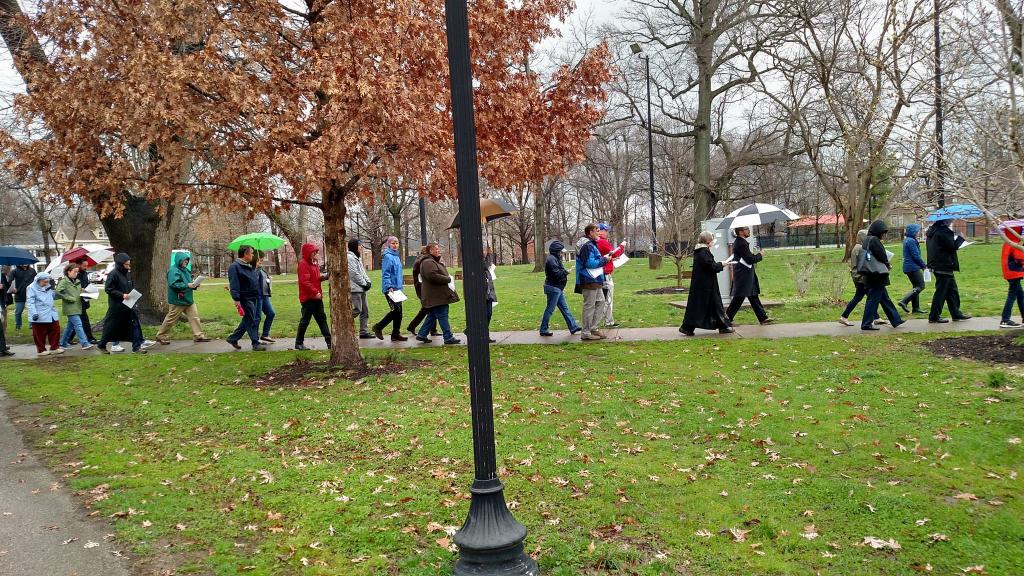
Privilege was the focus of the third station where we heard the story of Simon helping Jesus carry his cross.
I was reminded of all the ways my privilege wraps me in layers of protection from discrimination due to my religion, race, and social class. I thought about how the lack of privilege made Stephon Clark a target for yet another police murder. My memory recalled the countless people in my life who have helped me unravel and deconstruct these layers so that I could begin to understand the ways in which they are intertwined.
Jesus died so that privilege might fall away like old husks. So that we might emerge with a fresh commitment to justice.
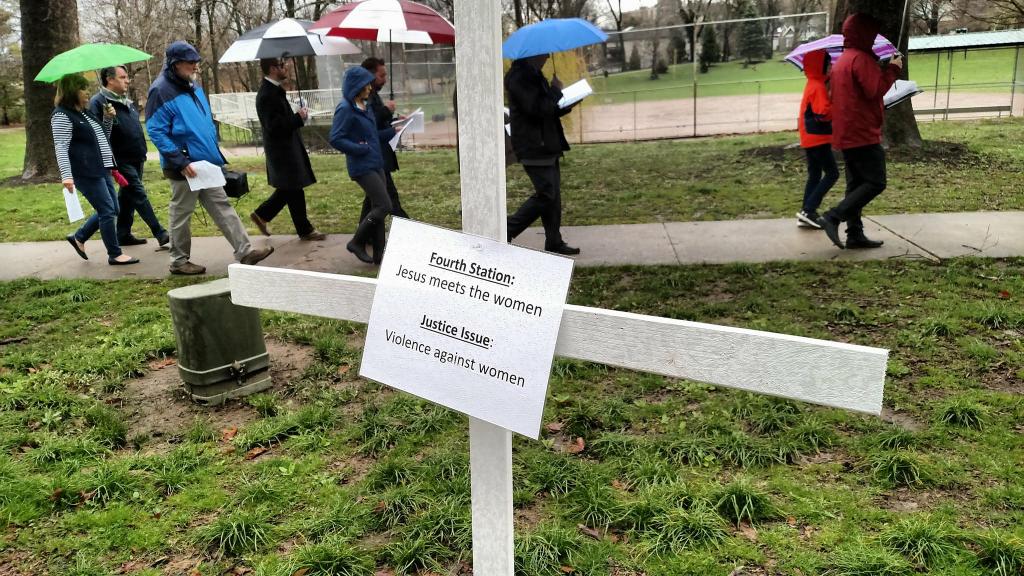
At the fourth station focusing on violence against women, we heard the passage where Jesus meets the women. Then the pastor reminded us that 80% of domestic violence victims are females.
She spoke of the realities of sexual harassment and abuse. And I recalled the stories from my students, my female colleagues in ministry, and my own ministry where our bodies were treated as objects. Our intelligence was dismissed. Our voices were stifled. Our spirits were violated.
Jesus died for the victims of sexual violence and human trafficking. Jesus died for the ones who dismiss, control, manipulate, punch, rape, and kill females, children, and males.
Who knows – maybe Jesus himself had been raped by those who captured and imprisoned him? Scripture doesn’t tell us. But I wondered about this as we walked, the rain falling harder. A man in the crowd moved closer to me so that his umbrella would cover my hooded head. A moment of grace. We walked together to the rest of the stations.
Gun violence was the theme of the fifth station where Jesus is nailed to the cross.
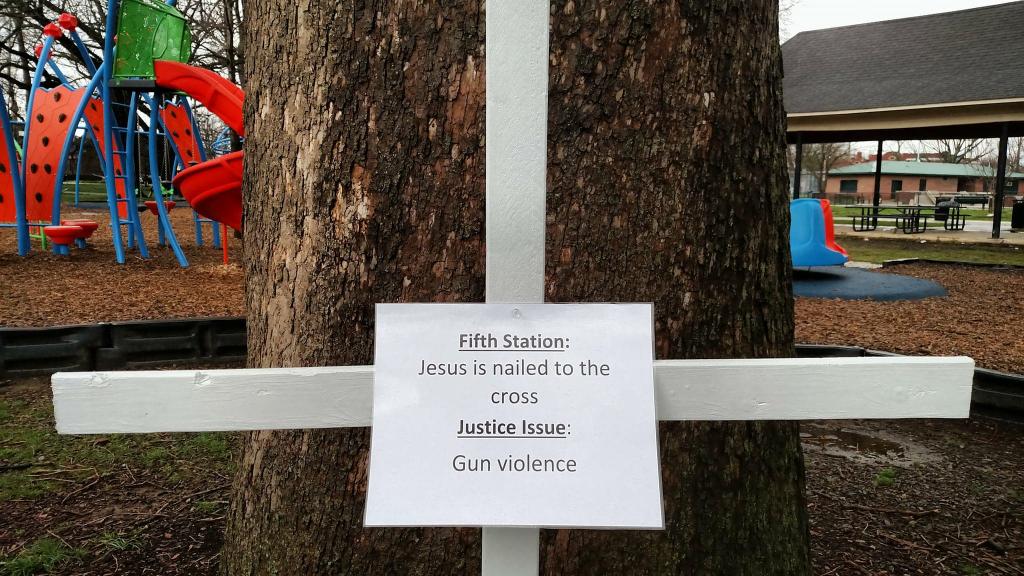
The pastor reminded us of another procession that had happened just last week – the March for Our Lives in our city and across the nation, even in other countries. He spoke of the hope he felt that his children and their peers were leading the way in addressing the problem of guns in our country. I thought of the siblings and mothers who had spoken in Lexington last week, telling us the stories of how their son, their daughter, their sister, their brother, their friend had died from a bullet.
Jesus takes another nail every time someone takes a bullet.
As we rounded the corner, we came to the sixth cross where Jesus’ worldly goods are taken from him. And we contemplated the combined issues and poverty and healthcare.
I winced remembering the tens of thousands of dollars of debt I have accumulated from having to purchase insurance for my family and myself in the years before the Affordable Care Act took effect. I thought of families I have met who have declared bankruptcy due to their medical bills. The thought of all the elected officials who have voted to unravel the safety nets that keep families from falling into poverty made me angry. I caught myself gritting my teeth. My dentist has told me to stop this, because I’ve already cracked one tooth.
Jesus died for confronting those who prey on the poor, those who control the resources of the common good with no mercy, those who are insulated by their wealth. I wondered if Jesus ever cracked a tooth from clenching his jaws in anger.
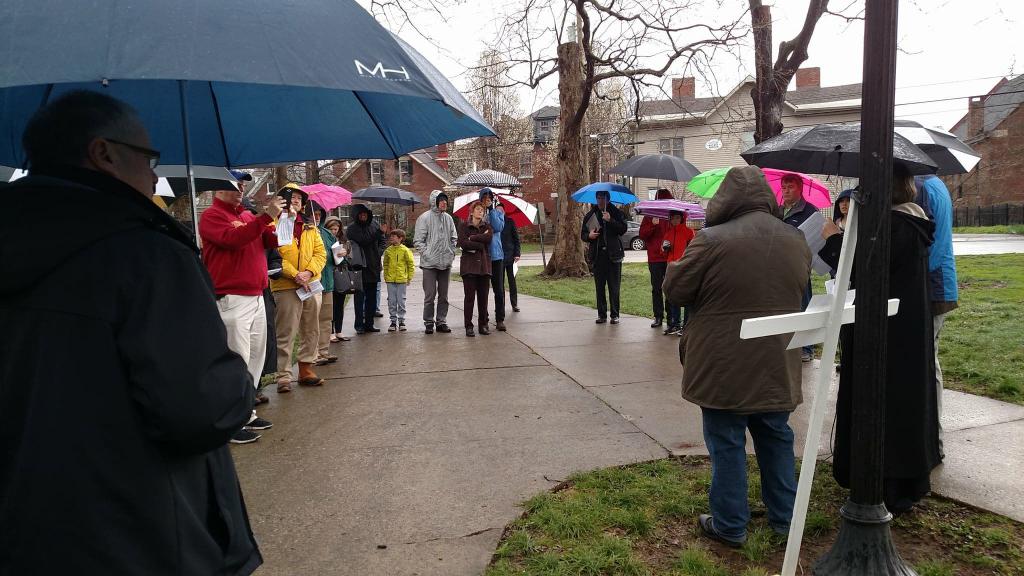
The seventh station was political polarization. At this cross we heard the story of Jesus crying out and breathing his last.
I thought about how much has died in this country from the fear, anger, hatred and violence that accompanies our divisiveness. Civility has died. Honesty and integrity. Respect and responsibility. Safety and decency. The things that make a society livable – all of this has breathed rasping final breaths under the crucifying weight of meanness, and downright evil. This is the newest focus of my work, the subject on which I am writing a book. How to restore the breath of life to our “purple zone” congregations and our society through pastoral prophetic preaching and dialogue.
Jesus died at the collision of political powers. Powers of hypocritical religious leaders. Powers of empire and militarization. Jesus’ lungs couldn’t hold up under that suffocating weight. It’s no wonder so many are dying . . . at the border; in hospital rooms; bedrooms; classrooms. “It is finished” echoes over and over again.
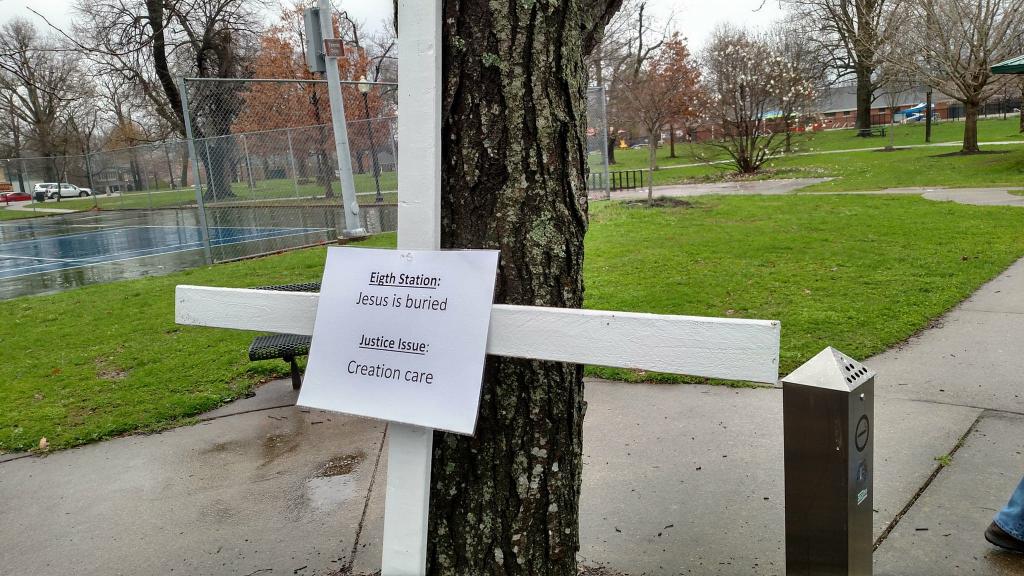
Finally – the eighth station: Creation care.
This is the station at which I had vowed to myself to remember Sudan the last male northern white rhino, who died on March 20th. At this station, Jesus is buried. And we remembered how Earth took in the body of Jesus.
This has been my life’s work for over fifteen years – helping people connect their faith to God’s Creation. I desperately want people to care enough to take action to protect land, water, air and communities. But over the last year I have watched all our efforts buried by an administration that is literally hell-bent on destroying the life-force of Creation. Sinister forces are at work, and they are having their way.
This last station is the most difficult for me. The rage and sadness and terror over what is happening to this planet, its climate, its ecosystems, and its species overwhelms me. Daily. Sometimes hourly, depending on the whims of the president and his cabinet appointments.
After the final hymn, one of the ministers handed out a resource booklet that contained information on agencies, websites, organizations, and publications for each issue.
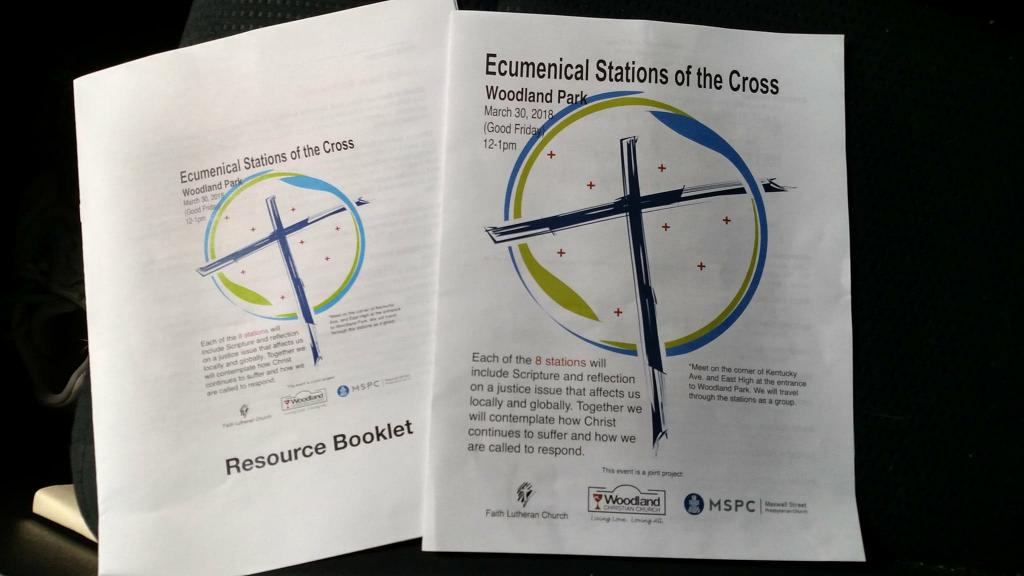
There were local as well as national organizations listed. I felt so grateful that these pastors had put together such a helpful guide that equipped us to continue this walk, even after the white crosses had been taken down.
More importantly, it reminded me that I am not alone in this walk.
I hugged the man who held his umbrella over me. I hugged the pastors – some of whom are my friends – and thanked them for all they had done to put together this service. Co-workers from my seminary and I talked about how meaningful the event was. I saw people I recognized from other congregations. And lots of people I had never met.
For one hour we gathered to walk, sing, listen, remember, and re-commit to the causes of justice. It was supposed to be the Via Dolorosa. But I discovered that it was also the Road to Emmaus. Because I saw Christ revealed among us – and going ahead of us – along the way.
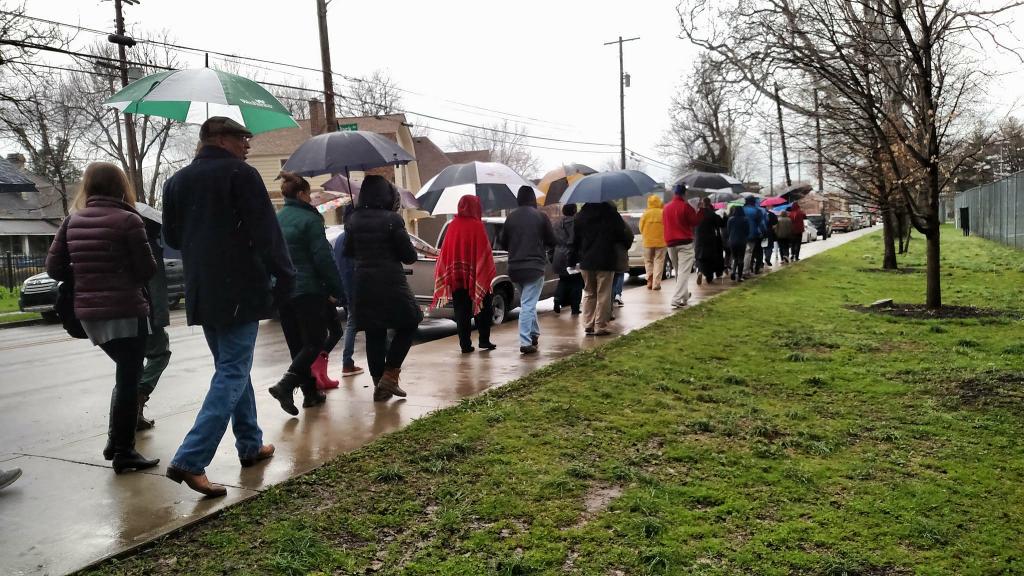
* The Ecumenical Stations of the Cross was a joint event sponsored by Faith Lutheran Church, Woodland Christian Church, and Maxwell Street Presbyterian Church. Clergy leaders and lay volunteers from other congregations also participated in leading the event.
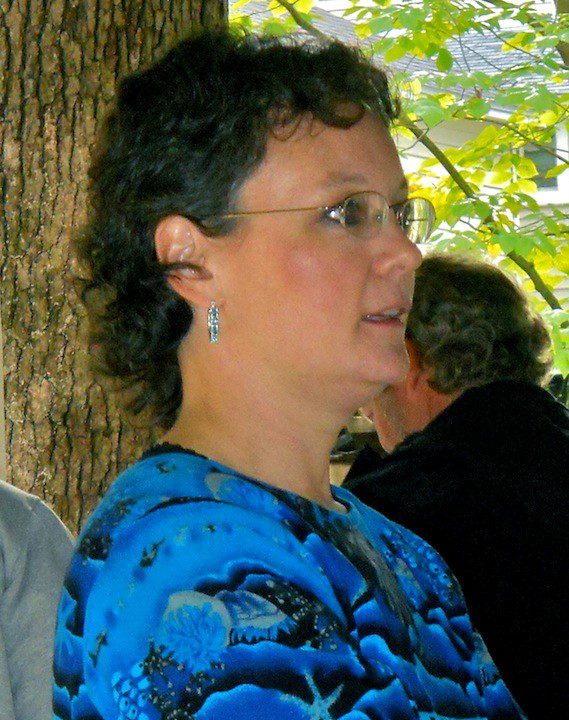
Leah D. Schade is the Assistant Professor of Preaching and Worship at Lexington Theological Seminary (Kentucky) and author of the book Creation-Crisis Preaching: Ecology, Theology, and the Pulpit (Chalice Press, 2015). She is an ordained minister in the Lutheran Church (ELCA).
Twitter: @LeahSchade
Facebook: https://www.facebook.com/LeahDSchade/.
Read also:
‘You’ve got some dirt on your forehead’: Ash Wednesday reflection
Those Who Wash: The Divine Disorientation of Maundy Thursday


